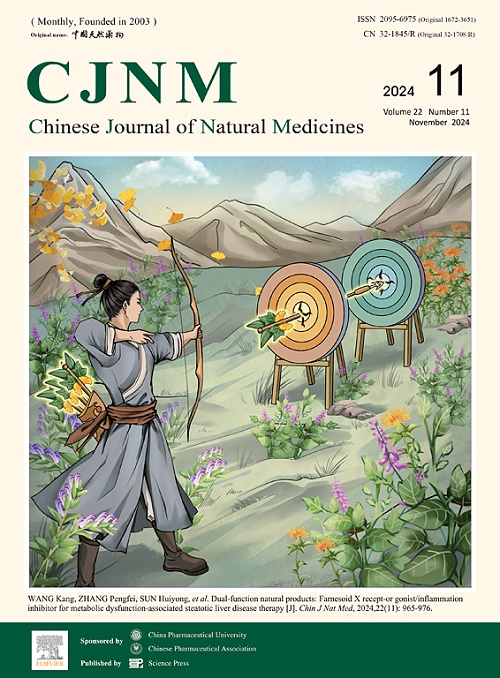Metabolomics as an emerging tool for the pharmacological and toxicological studies on Aconitum alkaloids
IF 4.9
2区 医学
Q1 INTEGRATIVE & COMPLEMENTARY MEDICINE
引用次数: 0
Abstract
Aconitum (Ranunculaceae) has a long-standing history in traditional Chinese medicine (TCM), where it has been widely used to treat conditions such as rheumatoid arthritis (RA), myocardial infarction, and heart failure. However, the potency of Aconitum alkaloids, the primary active components of Aconitum, also confers substantial toxicity. Therefore, assessing the efficacy and toxicity of these Aconitum alkaloids is crucial for ensuring clinical effectiveness and safety. Metabolomics, a quantitative method for analyzing low-molecular-weight metabolites involved in metabolic pathways, provides a comprehensive view of the metabolic state across multiple systems in vivo. This approach has become a vital investigative tool for facilitating the evaluation of their efficacy and toxicity, identifying potential sensitive biomarkers, and offering a promising avenue for elucidating the pharmacological and toxicological mechanisms underlying TCM. This review focuses on the applications of metabolomics in pharmacological and toxicological studies of Aconitum alkaloids in recent years and highlights the significant role of metabolomics in exploring compatibility detoxification and the mechanisms of TCM processing, aiming to identify more viable methods for characterizing toxic medicinal plants.
代谢组学是乌头生物碱药理和毒理学研究的新兴工具
乌头(毛茛科)在中医(TCM)中有着悠久的历史,它被广泛用于治疗类风湿性关节炎(RA)、心肌梗死和心力衰竭等疾病。然而,乌头生物碱的效力,乌头的主要活性成分,也赋予了很大的毒性。因此,对乌头生物碱的药效和毒性进行评价,对保证乌头生物碱的临床有效性和安全性至关重要。代谢组学是一种定量分析参与代谢途径的低分子量代谢物的方法,它提供了体内多个系统代谢状态的全面视图。这种方法已经成为一种重要的研究工具,有助于评估其疗效和毒性,识别潜在的敏感生物标志物,并为阐明中医的药理学和毒理学机制提供了一条有希望的途径。本文综述了近年来代谢组学在乌头生物碱药理学和毒理学研究中的应用,重点介绍了代谢组学在探索乌头生物碱配伍解毒和中药炮制机制方面的重要作用,旨在为乌头生物碱毒性鉴定提供更可行的方法。
本文章由计算机程序翻译,如有差异,请以英文原文为准。
求助全文
约1分钟内获得全文
求助全文
来源期刊

Chinese Journal of Natural Medicines
INTEGRATIVE & COMPLEMENTARY MEDICINE-PHARMACOLOGY & PHARMACY
CiteScore
7.50
自引率
4.30%
发文量
2235
期刊介绍:
The Chinese Journal of Natural Medicines (CJNM), founded and sponsored in May 2003 by China Pharmaceutical University and the Chinese Pharmaceutical Association, is devoted to communication among pharmaceutical and medical scientists interested in the advancement of Traditional Chinese Medicines (TCM). CJNM publishes articles relating to a broad spectrum of bioactive natural products, leading compounds and medicines derived from Traditional Chinese Medicines (TCM).
Topics covered by the journal are: Resources of Traditional Chinese Medicines; Interaction and complexity of prescription; Natural Products Chemistry (including structure modification, semi-and total synthesis, bio-transformation); Pharmacology of natural products and prescription (including pharmacokinetics and toxicology); Pharmaceutics and Analytical Methods of natural products.
 求助内容:
求助内容: 应助结果提醒方式:
应助结果提醒方式:


